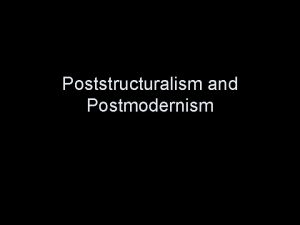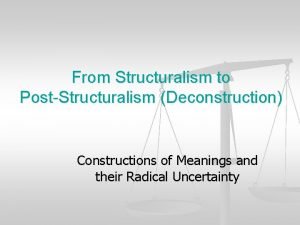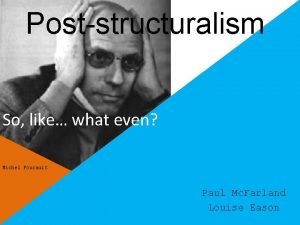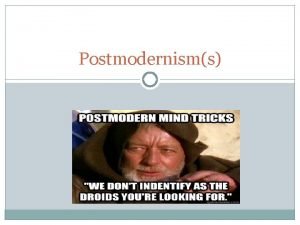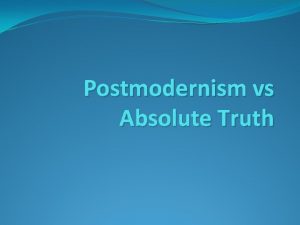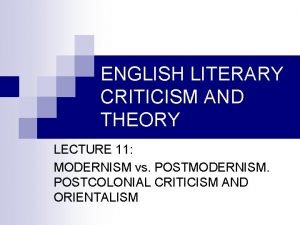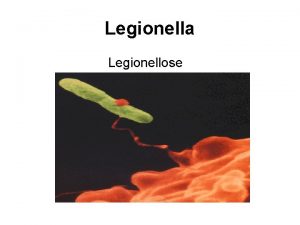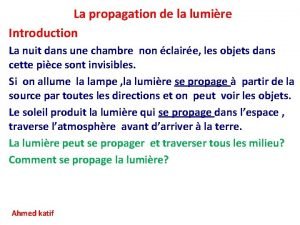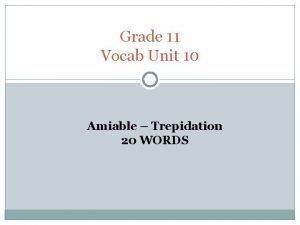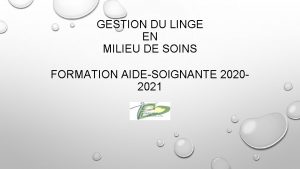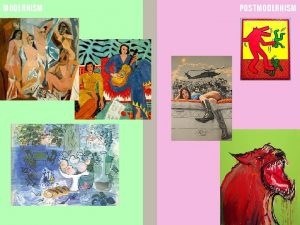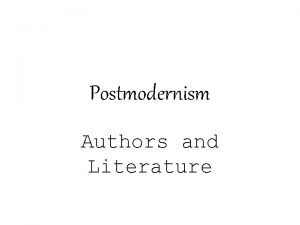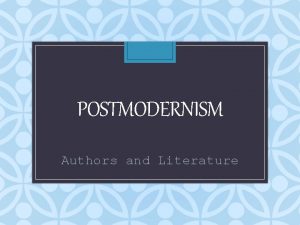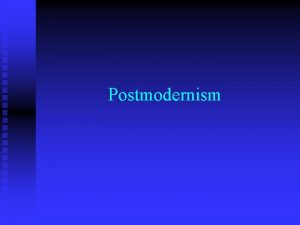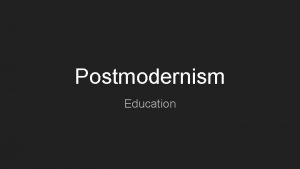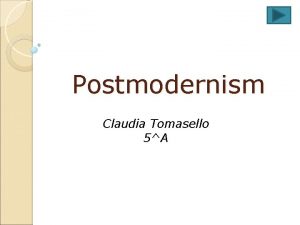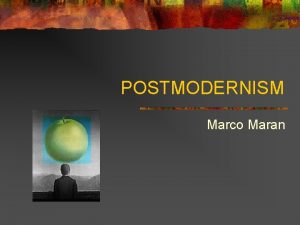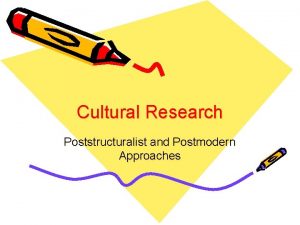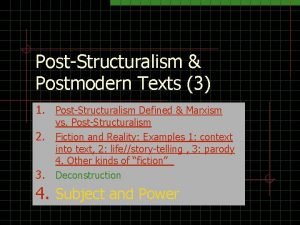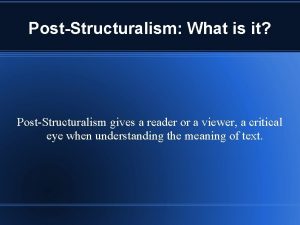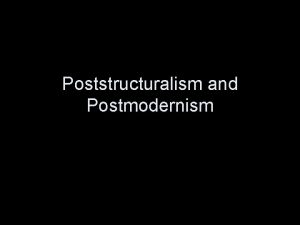Poststructuralism and Postmodernism Poststructuralism out of academic milieu









![[Postmodernism] consists not in demonstrating that the game works without an object, that the [Postmodernism] consists not in demonstrating that the game works without an object, that the](https://slidetodoc.com/presentation_image/3cfaef4776fc606bb10289f0be46d7b9/image-10.jpg)



- Slides: 13

Poststructuralism and Postmodernism

Poststructuralism - out of academic milieu of Linguistics, Anthropology and Philosophy concerned with Language Postmodernism - out of artistic and literary milieu concerned with Communications and commerical multi-media

Poststructuralism - Derrida, decentering, deconstruction Foucault struct - sign system as complete, finished, knowable as a whole with a center poststruct - sign-system as incomplete, unfinshed, inknowable - aporia whole systems vs. holes in systems sense-making vs. nonsense-making

Postmodernism - modernsim - Joyce, Woolf, Eliot, Yeats, Beckett non-realist collage, montage, pastiche, stream of consciousness. . . high-art, concentration on literary word pomo - latter looks at populist multimedia also non-realist collage, etc. video games, www, tv, vidoe self-conscious production shopping malls and Disneyland are typical postmodern texts

Lyotard and the postmodern condition The Postmodern Condition: A Report on Knowledge - 1979 canada- against 'grand narratives' - whole small-scale narratives working from local, no totalizing effects language games - Wittgenstein far/near differend - unknowable - aura

“Simplifying to the extreme, I define postmodern as incredulity toward metanarratives. ” “I shall call modern that art which. . . presents the fact that the unpresentable exists. To make visible that there is something which can be conceived and which can neither be seen nor made visible. ” - Jean Francois Lyotard

Sublime, simulacra, uncanny, bricolage, deconstruction, hyperreality, kitsch, panopticon, pastiche, palimpset

Freud: the uncanny is that class of the frightening which leads back to what is known of old and long familiar. Shelling: Unheimlich is the name for everything that ought to have remained secret and hidden but has come to light. Freud: the uncanny is in reality nothing new or alien, but something which is familiar and old-established in the mind and which has become alienated from it only through the process of repression.

But is there really a strange world? Of course. Are there, then, two worlds? Not at all. There is only our own world and it alone is alien to us, intrinsically so by virtue of its lack of mysteries. If only it actually were deranged by invisible powers, if only it were susceptible to real strangeness, perhaps it would seem more like a home to us, and less like an empty room filled with the echoes of this dreadful improvising. To think that we might have found comfort in a world suited to our nature, only to end up in one so resoundingly strange!” ― Thomas Ligotti, The Nightmare Factory
![Postmodernism consists not in demonstrating that the game works without an object that the [Postmodernism] consists not in demonstrating that the game works without an object, that the](https://slidetodoc.com/presentation_image/3cfaef4776fc606bb10289f0be46d7b9/image-10.jpg)
[Postmodernism] consists not in demonstrating that the game works without an object, that the play is set in motion by a central absence, but rather in displaying the object directly, allowing it to make visible its own indifferent and arbitrary character. - Slavoj Zizek, “The Obscene Object of Postmodernity”

from Jacques Derrida, Aporias What was going to be at stake in this word (aporia) was the ‘not knowing where to go. ’ It had to be a matter of the onpassage, or rather from the experience of the nonpassage, paralyzing us in this separation in a way that is not necessarily negative: before a door, a threshold, a border, a line, or simply he edge or the approach of the other as such. It should be a matter of what, in sum, appears to block our way or separate us in the very place where it would no longer be possible to constitute a problem, a project, or a projection, that is, at the point where the very project or the problematic task becomes impossible and where we are exposed, absolutely without protection, without problem, and without prothesis, without possible substitution, singularity exposed in our absolute and absolutely naked uniqueness, that is to say, disarmed, delievered to the other, incapable even of sheltering ourselves behind what could still protect the interiority of a secret.

The question of knowing what it means ‘to experience the aporia, ’ indeed to put into operation the aporia, remains. It is not necessarily a failure or a simple paralysis, but sterile negativity of the impasse. It is neither stopping at it nor overcoming it. (When somone suggests to you a solution for escaping an impasse, you can be almost sure that he is ceasing to understand, assuming that he had understood anything up to that point. ) Let us ask: what takes place, what comes to pass with the aporia? Is it possible to undergo or to experience the aporia, the aporia as such? Is it then a question of the aporia as such? Of a scandal arising to suspend a certain viability? Does one then pass through this aporia? Or is one immobilized before threshold, to the point of having to turn around and seek out another way, the way without method or outlet of a Holzweg or a turning that could turn the aporia – all such possibilities of wandering?

Flaubert’s Parrot highlights the joining of the postmodern interpretation of history with the necessity of establishing a saving ethic system, which characterizesthe British “new humanism. ” For Geoffrey Braithwaite, the protagonist of the novel, reality means not the identification of an ultimate structuring plan or finding absolutemeaning, but his openness to get involved in the search for meaning and in theattempt to recuperate the past. Geoffrey Braithwaite is aware of both theimpossibility of the past to be integrally regained and the fact that discourses onlyapproximate the disparate data of history; despite this and the degrees of imaginationas to the past, the line of reality must never be disregarded, since it limits ourfabulatory capacity. Barnes’ reaction to the historical relativism is not acontemplative one; on the contrary, it is one of uneasiness since the novelist isconcerned with the human constants that confer universal signification to existenceagainst the variable masks of transitory discourses. ECATERINA PĂTRAŞCU
 Postmodern milieu
Postmodern milieu Structualists
Structualists One direction songs one thing
One direction songs one thing Post structuralism michel foucault
Post structuralism michel foucault Post structuralism
Post structuralism Mileu therapy
Mileu therapy Modernism vs postmodernism literature
Modernism vs postmodernism literature Premodernist
Premodernist Post modernist
Post modernist Milieu bcye
Milieu bcye Schéma du circuit du linge hospitalier
Schéma du circuit du linge hospitalier Milieux translucides
Milieux translucides Vocab unit 10
Vocab unit 10 Circuit du linge propre et sale en milieu hospitalier
Circuit du linge propre et sale en milieu hospitalier
